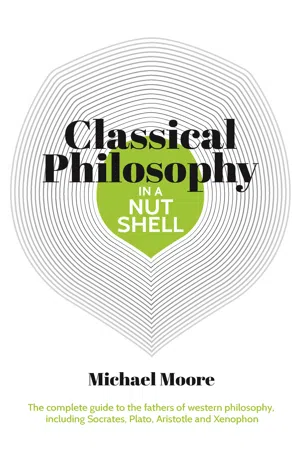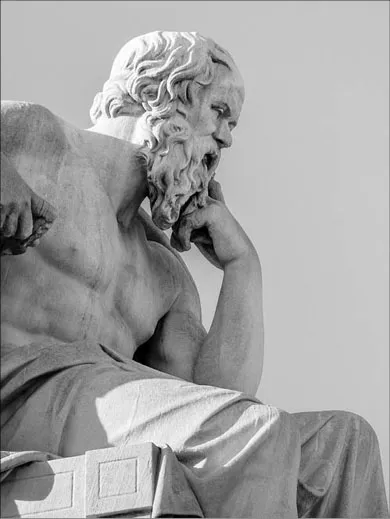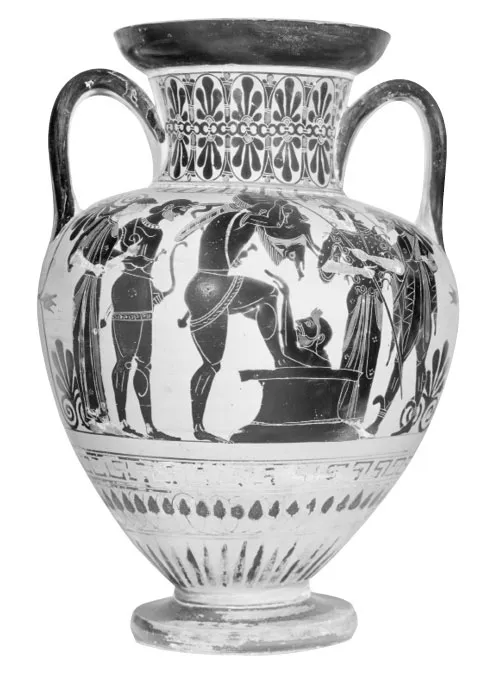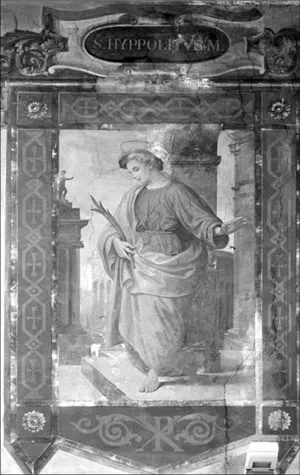
eBook - ePub
Knowledge in a Nutshell: Classical Philosophy
The complete guide to the founders of western philosophy, including Socrates, Plato, Aristotle, and Epicurus
- English
- ePUB (mobile friendly)
- Available on iOS & Android
eBook - ePub
Knowledge in a Nutshell: Classical Philosophy
The complete guide to the founders of western philosophy, including Socrates, Plato, Aristotle, and Epicurus
About this book
From Socrates' fascinating discussions of morality and virtue to Pythagoras' attempts to understand the arrangement of the cosmos, the thinkers of the ancient world provided us with an astonishing array of ideas that has helped to shape the modern world.Ranging across Ancient Greek and Roman philosophy from Anaximander to Plotinus, Classical Philosophy in a Nutshell explains important ideas such as Plato's Theory of Forms, Zeno's Paradox, and the Stoicism of Marcus Aurelius.Filled with helpful diagrams and simple summaries of complex theories, this essential introduction brings the great ideas of antiquity to everyone.
Frequently asked questions
Yes, you can cancel anytime from the Subscription tab in your account settings on the Perlego website. Your subscription will stay active until the end of your current billing period. Learn how to cancel your subscription.
No, books cannot be downloaded as external files, such as PDFs, for use outside of Perlego. However, you can download books within the Perlego app for offline reading on mobile or tablet. Learn more here.
Perlego offers two plans: Essential and Complete
- Essential is ideal for learners and professionals who enjoy exploring a wide range of subjects. Access the Essential Library with 800,000+ trusted titles and best-sellers across business, personal growth, and the humanities. Includes unlimited reading time and Standard Read Aloud voice.
- Complete: Perfect for advanced learners and researchers needing full, unrestricted access. Unlock 1.4M+ books across hundreds of subjects, including academic and specialized titles. The Complete Plan also includes advanced features like Premium Read Aloud and Research Assistant.
We are an online textbook subscription service, where you can get access to an entire online library for less than the price of a single book per month. With over 1 million books across 1000+ topics, we’ve got you covered! Learn more here.
Look out for the read-aloud symbol on your next book to see if you can listen to it. The read-aloud tool reads text aloud for you, highlighting the text as it is being read. You can pause it, speed it up and slow it down. Learn more here.
Yes! You can use the Perlego app on both iOS or Android devices to read anytime, anywhere — even offline. Perfect for commutes or when you’re on the go.
Please note we cannot support devices running on iOS 13 and Android 7 or earlier. Learn more about using the app.
Please note we cannot support devices running on iOS 13 and Android 7 or earlier. Learn more about using the app.
Yes, you can access Knowledge in a Nutshell: Classical Philosophy by Michael Moore in PDF and/or ePUB format, as well as other popular books in Philosophy & Ancient & Classical Philosophy. We have over one million books available in our catalogue for you to explore.
Information
Chapter 1
What is Classical Philosophy?
Introduction
In the spirit of the ‘In a Nutshell’ series, What is Classical Philosophy? gives a concise overview of the most significant philosophers from the classical period in a readily accessible book. The philosophers of ancient Greece and Rome are vast in number and exceptionally varied in their range of ideas. This book provides you with an introduction to the main characters in the story of classical philosophy and their fascinating ideas.
The book begins with Thales, and concludes with Plotinus, a period covering the better part of 1000 years. There are twenty chapters, each covering one or more important figures in the classical tradition. It should also be mentioned that the topic of classical philosophy can be a difficult and therefore intimidating subject. However, the subject need not be so. Often mere exposure to the ideas presented in classical philosophers has an effect on the comprehension of the reader. Many ideas, strange and exotic on their first appearance, will soon become familiar.
Classical philosophy, for the purpose of this book, is simply the philosophers and philosophical schools that existed in the ancient Greek- and Latin-speaking worlds. Plato and Aristotle observed that philosophy begins in wonder, and it was wonder at the natural world that prompted the first philosophers to begin speculation about the constitution of the physical world. When we add the study of ethics and logic to this interest in nature, we get a threefold understanding of philosophy in the ancient world: ethics, logic and physics, which is how many classical philosophers divided philosophy. The ancient understanding of ethics, logic and physics, however, is different from that of the contemporary world. In classical philosophy almost the entire range of human life, familiar to the ancient as well as modern person, is examined and explained. Often in the exploration of these topics further claims are advocated, about how to live and how we do or ought to think. Classical philosophy can be thought of as something like a method, not necessarily defined by a set of rules, but rather by an attitude committed to seek out explanation, truth and meaning using all the rich resources of the human mind.

Greek and Roman thinkers debated a range of subjects that they often categorized as ethics, logic and physics
Classical philosophy is a subject taught academically throughout the West, often beginning with Socrates and Plato. Although Socrates and his student, Plato, do indeed begin a shift in philosophy, it is more intellectually fruitful to begin with the philosophers who preceded them. These so-called Presocratics not only set the stage for the kinds of questions and interests that follow in later eras, but they advocated views which were simultaneously fiercely defended and adamantly opposed. It is in the light of these debates that the later philosophers make their intellectual contribution. Thus, Plato adapts Heraclitus’ theory of flux to his own theory of knowledge. The sophists look at the long history of bickering philosophers, observe the difficulty of coming to certain conclusions, and decide to focus on the teaching of argumentation. The sceptics, with similar information, decide that we should withhold from having opinions. Aristotle directly contradicts his master, Plato, in many areas, including, significantly, his political and ethical theory.
Classical philosophy can be a difficult and intimidating subject; however, it need not be so. Often mere exposure to the ideas presented by classical philosophers has an effect on the comprehension of the reader. For instance, it may sound odd to hear that Aristotle thinks that someone must be virtuous in order to live a happy life. We may immediately bring to mind examples of several 20th-century despots and dictators who were surely ‘happy’ while living a life characterized by wickedness, indulgence, injustice and other odious behaviours. Yet on further reflection it is not hard to sympathize with Aristotle’s belief that in order to be truly happy one has to live a life in accordance with the virtues. At least we feel that if one is a moral wretch, one should be miserable and unhappy.

Classical philosophy as a subject often begins with Socrates, but a whole range of influential ‘Presocratics’ came before with their own unique and insightful ideas
As one encounters classical philosophy, or any philosophy for that matter, it is important that modern conceptions associated with the term ‘debate’ or ‘argumentation’ be kept in check. That is, we tend to think of differing opinions as the manifestations of different personalities bickering. In the examination of philosophers from the past, however, such a perception is not only misguided but also misguiding. Classical philosophers disagreed strongly with each other, but it was almost always about something, never about someone. This is to say that differing opinions focused on issues, even if parochial prejudice sometimes did intrude into these disputes. Likewise, if we do not have an appreciative respect for the philosophers themselves, their arguments can slip our understanding. It is hard, for example, to take seriously the views of some Presocratics who claim the sun is a bowl of fire or the Socratic belief that no one willingly does evil. But it is precisely a type of open-mindedness to these ideas that makes them understandable. If we continually ask ourselves, ‘Why was this believed?’ we can more easily understand with a sympathetic mind. If, on the other hand, we go looking for the absurdity in a strange idea, we are sure to find it there. To contemporary eyes, it is, after all, a strange idea.
One approach to the history of philosophy up to the time of Aristotle was to explain philosophy as a long search for one or more principles by which to explain the existence of the world. This trajectory was fixed by Thales’ conception of the primary principle as water, and later philosophers, for better or for worse, continued with this project, offering their own candidate instead of water. Anaximander offered the boundless, Anaximenes offered air, Empedocles the four elements and strife/love, and Parmenides the unity of the One. There were others, of course, but these examples are sufficient to demonstrate a shared goal and a commitment to a type of explanation that would fit with the purposes of that goal. To be sure it was nothing like modern science, where progress, accumulation and consensus create new knowledge. No person or idea, for example, could stand in as an explanatory principle for the universe. The cosmic principle had to be something at least nominally physical, in order to explain the physical universe, and impersonal, to explain the material makeup of things. Thus, although not necessarily openly collaborative, there is a sense that classical philosophy was a socially organized enquiry.

Poets like Homer and the tales they told shaped the world in which the classical philosophers lived
In addition to shared goals, there were often shared assumptions. Many of the disputes when it came to how one should live nevertheless arose in the context of a common culture. For example, many Greek philosophers took it for granted that there were four chief virtues: wisdom, courage, temperance and justice, and that happiness (eudaimonia) was the chief goal of human living. Many also believed that living in accordance with nature, since nature provides a guide for us, was a rule we simply had to adopt. The problem, of course, was in what sense is something in ‘accordance with nature’? It is difficult to say if ancient Greeks, for example, were more on the same page among themselves than contemporary philosophers are nowadays. With thousands of years of opinions from which to pick it is perhaps understandable that modern philosophers have many considered and differing opinions on all manner of topics. However, it is noteworthy to observe as an example that Socrates, as iconoclastic as he was, did not fundamentally challenge the existence of the gods in his courtroom defence, but rather contested the picture of the gods as conceived by the populace. At any rate, shared cultural, ideological and theological beliefs formed the ground for dispute in the ancient world to a degree often underappreciated.
Literary Background
The fledgling discipline of philosophy was influenced by the religious and literary cultural inheritance at the time. Without doubt the views of ancient poets such as Homer and Hesiod helped form the world in which philosophers would emerge. Homer, for instance, speaks of the shade-like spectres of the deceased and the transience of life. Within the Iliad and Odyssey, many heroes are considered paradigms of moral life, examples that later philosophers, such as Plato and Aristotle, referenced in their own works. Additionally, the tragedians, discussing complex issues of moral and civic life, were important contributors to the intellectual development and progress of the ancient Greek mind.
Religious life also, particularly in the Greek and Roman models, was not encumbered by the strictures of dogmatism. As a result, speculation and theory were allowed to develop. In addition, the myths, often transmitted by the epic poets and tragedians, are a type of pre-philosophy. In his own history of philosophy in the first book of his Metaphysics, Aristotle says that the myth-lover is a philosopher, since myths are sources of wonder. Aristotle does not explain exactly how this is so, but a way to interpret this is that myths were often employed by his master Plato as symbolic of deeper philosophic truths. Myths were or could be metaphors or allegories for other truths, like the nature of the soul, the meaning of love and the human contemplation of mortality.

The work of Hippolytus of Rome provides much of our knowledge of Presocratic thought
Much of classical philosophy persists to this day because of its transmission by, at times, hostile witnesses. The surviving work of the Presocratics is especially fragmentary, and their beliefs and sayings are quoted or paraphrased by multiple later authors. Well after the birth of Christ, Christians, keen to demonstrate the unorthodox paganism of the ancients, quoted the Presocratics and other later philosophers. Hippolytus in his Refutation of All Heresies is especially important as a witness to Presocratic thought, while Clement of Alexandria in Stromata explains the views of many ancient thinkers, philosophers among them. Ideological allies also preserved thoughts and opinions; for example, it was only the later Stoic authors who quoted the early Stoic teachers, absent in all other texts.
One author who garners perhaps too much criticism for his gossipy and eclectic collection of classical philosophy is Diogenes Laertius. Diogenes lived in the 3rd century ad and amassed a history of philosophy in ten books. Many of the facts and testimonies in his books appear nowhere else. However, for whatever reason, Diogenes does not always demonstrate a discriminating mind for philosophical nuance. Thus some scholars, glad that he has preserved much for us, see in him a rich resource, while others lament his work as insufficient and untrustworthy.
One interpretive difficulty is the degree of credulity we are to give to the texts. The quotations and personal history of some philosophers, we may gather, were selected for their headline appeal. Particularly outlandish quotations, taken out of context, were perhaps a choice tidbit for ancient ears. There is also the worry that antagonistic motives contributed to authors being portrayed in less than favourable lights. These worries are lessened, however, when multiple sources in the case of fragmentary authors, as well as holistic interpretive approaches, are applied to the philosophers.
In conclusion, to obtain the broadest possible view of classical philosophy, both the progression and breadth of thought should be kept in mind. Some authors may appeal more than oth...
Table of contents
- Title Page
- Introduction
- Philosophers’ Family Trees
- Chapter 1 • What is Classical Philosophy?
- Chapter 2 • Thales, Anaximander, Anaximenes
- Chapter 3 • Anaxagoras
- Chapter 4 • Empedocles
- Chapter 5 • Parmenides and Zeno
- Chapter 6 • Pythagoras and his Disciples
- Chapter 7 • Heraclitus
- Chapter 8 • The Atomists – Leucippus and Democritus
- Chapter 9 • The Sophists
- Chapter 10 • Socrates
- Chapter 11 • Plato
- Chapter 12 • Aristotle
- Chapter 13 • Philo of Alexandria
- Chapter 14 • The Sceptics
- Chapter 15 • The Stoics
- Chapter 16 • Epicurus
- Chapter 17 • Lucretius
- Chapter 18 • Seneca
- Chapter 19 • Epictetus
- Chapter 20 • Marcus Aurelius
- Chapter 21 • Plotinus
- Chapter 22 • The Legacies of Classical Philosophy
- Glossary
- Picture Credits
- Copyright